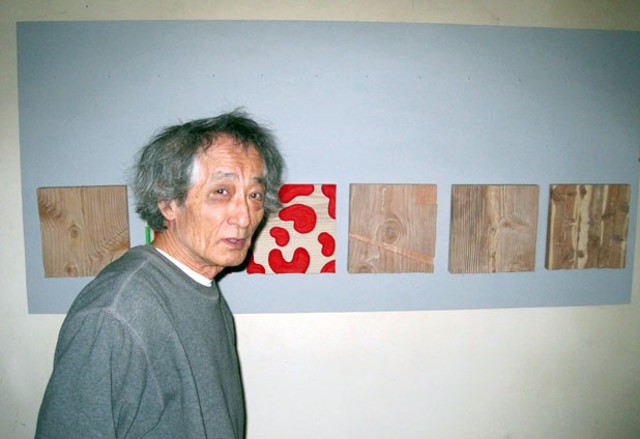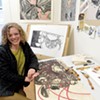Published March 21, 2012 at 6:12 a.m.
Down in a Duxbury hollow, an 80-year-old Japanese American artist sculpts in solitude and near obscurity — which is just the way he likes it. Nori Morimoto carves abstract works in wood, as well as tables and lamps, in an untidy former lumber mill that has served as his home and studio since 1987.
Morimoto’s delicately rendered forms remain largely unknown in Vermont but are popular in Japan. The beauty of his creations would suffice to explain their sales there, but the Vermont mystique that he says exists in Japan doesn’t hurt, either. The Art Front Gallery in Tokyo sought to capitalize on the state’s charisma by titling its recent show of 250 Morimoto sculptures “The Enchanted Forest: Scenes from Vermont.”
Morimoto has never had a comparable exhibit in his adopted state; only smatterings of his work can be found at the West Branch Gallery & Sculpture Park in Stowe. “Not many people in Vermont are interested in seeing my stuff,” the artist says matter-of-factly. “The majority of people here don’t understand it.”
That appraisal draws a sad assent from West Branch co-owner Christopher Curtis. Although he’s personally a big fan of Morimoto’s “very soulful” work, Curtis confides that he seldom finds buyers for it. “We get a lot of ‘Ooh, do you have any paintings of cows?’ You won’t find an Asian look in many Vermont homes.”
And Asia — Japan, specifically — is the unmistakable source of Morimoto’s aesthetic, which entails close observation of nature. Curtis sees a distinctively Japanese look in the alternately wavy, chunky and circular patterns that Morimoto coaxes from blocks of maple, walnut and ash. “There’s some intervention in the wood, but the integrity of the material is still highly respected,” Curtis says in situating Morimoto’s work within Japan’s artistic tradition. “He’s able to pull remarkable forms out of that material.”
Some Americans do appreciate Morimoto’s achievements, and millions more glimpse one of his pieces every weekday, without realizing it. That bandy-legged coffee table alongside “Today” host Matt Lauer is a Morimoto creation, though its glass top is an NBC addition. The Rockwell Group, a Manhattan-based international design firm, has purchased Morimoto’s furniture pieces, as has the high-end Nobu chain of Japanese restaurants, notes Yukari Hoest, one of the artist’s three adult children.
Morimoto also has a direct connection to Japanese cuisine. The KuraBarn restaurant in Huntington, on Long Island, that he opened in the 1970s continues to draw diners from the New York City suburbs and beyond. Morimoto says his mother taught him how to cook Chinese and Japanese cuisine, and he’s since added Italian and French dishes to his personal repertoire.
The artist’s wife, Noriko, who suffered a stroke 10 years ago, still lives in the Huntington home that the Morimotos bought in 1971. Morimoto outgrew his former workshop in a Long Island garage and came to Vermont in the mid-’80s. It was love at first sight for the old Duxbury mill, now a studio filled with tools and scraps of wood, and a nearby small house where Morimoto eats and sleeps. He visits Noriko about once a month but admits with a smile, “I don’t really miss my wife. I do miss my art when I leave here.”
Morimoto, who is perhaps five feet tall and wiry, with tousled salt-and-pepper hair over a worn face, lives and works alongside the Crossett Brook. The water, which gurgles placidly during a recent visit, nearly inundated his buildings during Tropical Storm Irene.
He apologizes to his visitors that there is little work to see — he’s just returned from delivering much of it to Tokyo — but clusters of Morimoto’s unique three-legged tables and stools still occupy the workshop, as well as handmade lamps that resemble stands of reeds. Asked the price of a wood assemblage on the wall, he says without hesitation, “$10,000.”
Before settling on Vermont, Morimoto reveals, he looked for a place in the Carolinas, but the racism he encountered there, along with the advice of a friend, led him to head north instead. He loves Vermont, Morimoto says, and adds, “The people are so nice.”
It may be destiny that led him to contented isolation in Duxbury’s enchanted forest. Hoest, the artist’s 50-year-old daughter and manager of the KuraBarn restaurant, notes that her father lived as a teen and young adult in a rural region of southern Japan. Coincidentally, “Morimoto” means “on the edge of the woods” in Japanese.
“He’s come full circle,” Hoest observes.
Along the way, Morimoto was drawn to bright lights and big cities; he spent a few years in Tokyo before migrating to Manhattan in 1957. He came in search of Raymond Loewy, the graphic artist who designed the Lucky Strike cigarette logo. Morimoto had become captivated by the four-color bull’s-eye on the Lucky packs discarded by American GIs in postwar Japan.
In New York, he studied graphic art and fell in with a small group of artists with Japanese roots who had likewise sought inspiration and connections in the global capital of modern art. Among them was Isamu Noguchi (1904-1988), who is regarded as one of the titans of 20th-century sculpture as well as a notable designer of furniture and lighting. “Noguchi was a fantastic artist,” Morimoto says. “I learned a lot from him.”
There are some similarities between the two men’s abstract sculptures. Their tables and lamps reflect a shared approach of melding Western modernism with traditional Japanese design. Noguchi, however, was born in Los Angeles to an American mother and Japanese father, and he worked in a variety of mediums, while Morimoto has focused on the woods that surround him in Vermont.
“All of nature is abstract,” Morimoto says, explaining why he favors that mode over more representational work. “Look at the trees, the leaves, the branches. All have different shapes, different angles. All are abstract.”
Morimoto hasn’t been the warmest of fathers, Hoest reveals, describing him as “self-centered.” But it’s clear that she respects Morimoto’s commitment to his art as well as the “perfectionism” that, she says, he passed along to her and his other children: Risa, a filmmaker; and Mido, a former ski racer who now works as a contractor.
Morimoto does seem utterly self-contained — to the point of making his own sculpting tools out of pipes and pieces of metal. Although he’s a polite conversationalist in still heavily accented English, Morimoto admits to preferring the company of his art to that of people. He works all day, every day, sometimes forgetting to stop for lunch.
Does it get lonely down in his hollow? “I talk to the wood,” Morimoto says, and adds that it sometimes talks to him as well. Besides, he observes, “Wood is like human beings: Some is very tough, some is medium, some is soft.”
More By This Author
Speaking of Art, eyewitness
-

Q&A: Catching Up With the Champlain Valley Quilt Guild
Apr 10, 2024 -

Video: The Champlain Valley Quilt Guild Prepares for Its Biennial Quilt Show
Apr 4, 2024 -

Q&A: Meet a Family in Waterbury That Embraces Halloween Year-Round
Feb 14, 2024 -

Video: Goth Family in Waterbury: Sarah, Jay and Zarek Vogelsang-Card
Feb 8, 2024 -

Q&A: Art Entrepreneurs Tessa and Torrey Valyou Celebrate 15 Years of New Duds
Oct 11, 2023 - More »
Comments
Comments are closed.
From 2014-2020, Seven Days allowed readers to comment on all stories posted on our website. While we've appreciated the suggestions and insights, right now Seven Days is prioritizing our core mission — producing high-quality, responsible local journalism — over moderating online debates between readers.
To criticize, correct or praise our reporting, please send us a letter to the editor or send us a tip. We’ll check it out and report the results.
Online comments may return when we have better tech tools for managing them. Thanks for reading.















































